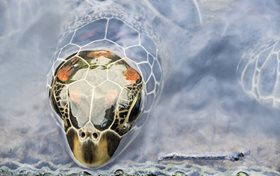
Tortuguero National Park in Costa Rica is home to the largest working sea turtle rookery in the western hemisphere, and has been recognized by the Smithsonian National History Museum as one of the world’s greatest marine conservation success stories.
The seven different species of sea turtles are the descendants of reptiles, which have inhabited the planet for millions of years. Feeding at coral reefs and nesting on beaches, they play a vital role in maintaining a healthy balance of the world’s marine ecosystems. Regrettably, sea turtles have been on the endangered species list for several decades, and their existence continues to be threatened today by three external causes: commercial fishing, unethical hunting, and climate change.
Sea turtles swim in the ocean but also have to come up on the surface to breathe. Commercial fish trawlers in these areas cast drift nets, some as large as a square mile, across the ocean floor. Sea turtles become trapped underwater in these nets and are drowned.
Sea turtles are also prey to hunters who track them for their meat and their eggs, which some cultures value for medicinal and religious purposes. Curio and souvenir salesmen also seek the shells of the turtles for luxury tortoiseshell ornaments, which are in great demand all over the world. This unethical hunting contributes to the death of tens of thousands of sea turtles each year.
Climate change also greatly effects the sea turtles, which wait decades to lay their eggs, returning by instinct to their own birthplace beach to dig nests in the sand and lay their eggs. Beach erosion can foil the turtles’ attempts to successfully nest, as well as jeopardizing the already-challenging statistics of survival for the hatchlings. Scientists are also convinced that climate change is adversely affecting the sex ratio of the species.
The World Wildlife Fund suggests three concrete ways we can make a real difference to reversing the critical vulnerability of endangered sea turtles, both at home and while traveling in countries where the sea turtles nest and feed.
1. Choose to eat only humanely-caught or farmed seafood and encourage your supermarket, favorite restaurant, and friends to do the same.
2. Think carefully before supporting unethical hunting through the purchase of coral or tortoiseshell ornaments while you are on vacation or shopping for curios.
3. Support the important work of national parks and sea turtle rookeries like Tortuguero by choosing to travel on programs that not only help to preserve and sustain endangered species like the sea turtle, but also support and sustain local communities.
Alexander+Roberts is committed to supporting ethical and ecotourism travel in all of our destinations and we take great pride in our cooperation with Tortuguero National Park, which we visit on numerous Costa Rica itineraries including our popular
Treasures of Nature in Costa Rica.